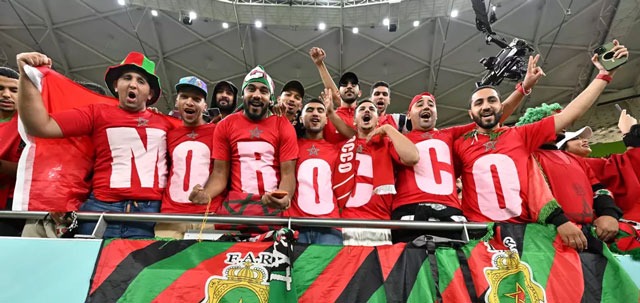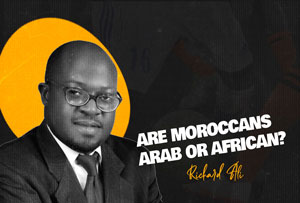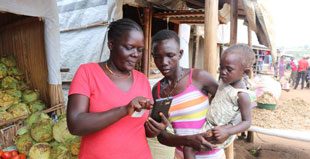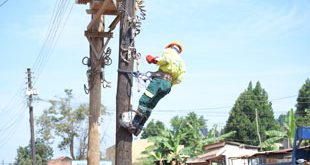
With a shared history in addition to geographic, religious and economic ties with the rest of Africa, why is Moroccan identity controversial?
COMMENT | Richard Ali – BIRD AGENCY | When Morocco held firm with a 1-0 win over Portugal despite Portugal’s dominance in the quarterfinal match at the Qatar World Cup, Africans worldwide roared their approval. An African side had made it to the World Cup semi-finals for the first time.
However, a statement by team captain Sofaine Boufal following their round-of-16 win against Spain, acknowledging Muslim and Arab support and ignoring Africa altogether, ignited a virtual riot that touched on one of Africa’s most dramatic fault lines—the identity question. Did the Moroccans not see themselves as African? Millions of African supporters said “no” – and turned their support elsewhere.
How could this happen? Let’s start at the beginning.
Africa’s most recognisable geographical feature is the Sahara Desert which neatly divides the continent into a northern portion, dominated by the Berber ethnic group bordering the Mediterranean and a much larger and far more diverse southern half. That the term “sub-Saharan” is used for the latter (while the cognate word, “sur-Saharan”, is never used), is as problematic as “MENA”, an analysts’ term that lumps the northern portion of the continent with the Middle East.
Beyond geography, the arrival of Islam in the 7th century saw a steady conversion of previously Jewish, Christian, and animist Berber groups into a cultural “Arab” identity cemented by centuries of alternating opposition and cooperation with ethnically Arab co-religionists. Egypt and Libya were radically changed in this period, and the modern state institutions of Algeria, Tunisia, and Morocco are rooted in those centuries.
This heritage—Moroccan, Arab, Muslim—informed Boufal’s most immediate vote of thanks which alienated African football fans in desperate need of a team to root for. Boufal quickly apologised and embraced the continent even as the conversation, like the football, continued. The captain’s resounding lack of a specific African mention, however, masks more profound issues.
The blind spot to the other is not always a north-to-south one in which the Berbers can be accused of “pretending not to be African”. There is seldom any curiosity about the realities of the north from other parts of Africa. Often, there exists a complicit indifference. The silence of the African elite over the NATO-led removal of Libyan leader Muammar Gaddafi in 2011 is the most damning example of this. This was even though Gaddafi, a north African and a Berber, had put more of his resources into the work of pan-Africanism than the next five African leaders combined.
Morocco presents interesting paradoxes of which many Africans are unaware. Morocco has been a player in West African history since around 1591, when it defeated Songhai to dominate the inner Niger delta, governing from Timbuktu. A wholly sub-Saharan African infantry corps descriptively named the Black Guard served the current Alawite dynasty in a similar role to the Praetorian Guard and the Janissaries in European history and was an essential faction in Moroccan politics for centuries.
Today, Morocco’s closest ally is Senegal. It shares a Sufi tradition, including reverence for Sheikh Ibrahima Niasse of Senegal, a leader of the Tijaniya brotherhood, which is rooted in Fez, Morocco.
And, perhaps the most important development for Morocco’s future, which has seen it vastly expand its port infrastructure at Casablanca, is a US$25 billion gas pipeline from Nigeria’s Niger Delta, which will not only supply the gas needs of 13 African countries and industrialise the region but will also cement Morocco and Nigeria as strong players in the lucrative European energy market.
Nonetheless, the discursive divide between northern and southern Africa, which underlies the Sofaine Boufal controversy, restates the African Union’s failure to create a coherent African identity at a street level, across its member states.
The African Union has a Humanitarian Affairs and Social Development department currently headed by Minata Samate Cessouma from Burkina Faso, which includes a Sports and Culture Division. Beyond merely celebrating individual or national achievements by dubbing them “African”, the task of coordinating efforts – and the real task of building connections between citizens of the AU – is left undone.
Sadly, Ambassador Samate Cessouma’s failure is symbolic of the larger African Union Commission. Holding her accountable for failings that predate her tenure is impossible.
Building an African identity that is not merely ad-hoc must come from creating functional interconnections across the continent. Frameworks that allow the free flow of people and influence from one place to another must be speedily embraced. Implementing the African Continental Free Trade Agreement (AfCTA) and the Yamoussoukro Decision on open skies would make Africa real to the average citizen.
Morocco’s continued success on the football field, with a 1—0 thrashing of Portugal, has galvanised African passion around the continent’s sole representative at the Qatar World Cup even as it prepares to face a French team packed, as usual, with African players. It remains to be seen whether this will lead to greater self-identification amongst Africans at the street level and if the backing up of institutions of cooperation with action beyond words will be taken up.
*****
SOURCE: bird story agency
 *Richard Ali is a Nigerian lawyer, and author with an interest in internal security matters, particularly preventing and countering violent extremism (PCVE). A former columnist at the Daily Nigerian, he is the CEO of Engaging Borders SRD.*
*Richard Ali is a Nigerian lawyer, and author with an interest in internal security matters, particularly preventing and countering violent extremism (PCVE). A former columnist at the Daily Nigerian, he is the CEO of Engaging Borders SRD.*
 The Independent Uganda: You get the Truth we Pay the Price
The Independent Uganda: You get the Truth we Pay the Price



